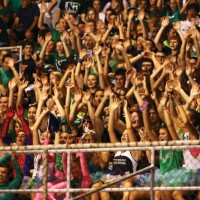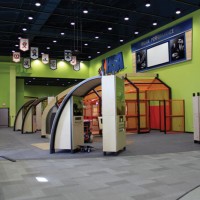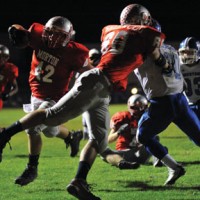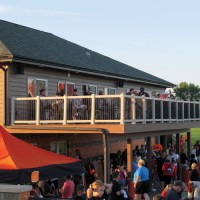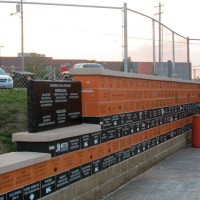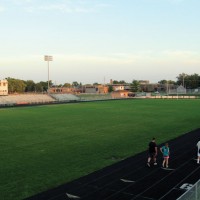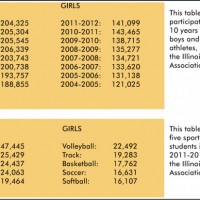Sports
High School Sports Rule
- Details
- Published on Monday, 03 September 2012 09:38
- Written by Paul Gordon
Did you hear about the $60 million football stadium being built in Texas? Oh, it's not for the Dallas Cowboys or the Texas Longhorns. It is an 18,000-seat stadium for a Dallas suburban high school.
So there are obviously some fans of high school sports that are more fanatical than those in central Illinois. But around here, there are an awful lot of people who believe their high school sports trumps anything else from the end of August to the end of May.
For many, summer is just a rest period until football season starts the cycle all over again.
On any given Friday night from the end of August to the end of May, one can usually find some kind of high school sporting event to see. And by the sizes of the crowds, particularly in football and basketball seasons, it is evident that is what people want to do.
"One of the things about Illinois high school sports is tradition. That is a big part of it," said Matt Troha, assistant executive director of the Illinois High School Association, the governing body of high school sports in the state.
"For years it was the main form of entertainment on weekends, especially Friday nights in small towns. It has stayed very popular and we think it continues to grow in popularity. People love to get behind their kids and their schools and the players love performing in front of their families and friends. High school sports are big," said Troha, who played football at Joliet Catholic, one of the most successful high school football programs in the state.
Another alumnus of a successful program is Derrick Booth, the head basketball coach at Peoria Manual High School. He played there, was an assistant coach there and now is entering his sixth season as head coach.
"High school sports are important to the students, to the schools, to the fans. They are an important part of the education of the student athletes," said Booth, a guidance counselor at Manual when he isn't on the sidelines.
He noted, however, that the dynamics of high school sports have changed with the growth of social media, the Internet and AAU programs. "Those all have created a whole new element for high school athletes and enable even more people to follow them. That becomes a different kind of challenge for coaches, who have to keep the focus of their top players on the team instead of the individual," he said.
A 1991 Manual graduate, Booth said these weren't issues when he was coming up. "There is more emphasis on high school athletes now than ever before," he said.
With the pending opening of the Peak Performance Center, the IHSA-sponsored, interactive exhibit in the new Peoria Riverfront Museum, it is clear the kind of emphasis that is put on high school sports in Illinois.
The decision to place the Peak Performance Center in Peoria shows that the Peoria region — home of March Madness basketball state finals as well as the state finals of baseball, softball and cross country and other big events — is the hotbed for high school sports in this state.
AFFECTING THE ECONOMY
The museum opens Oct. 20 and IHSA officials are excited about it, Troha said. So are central Illinois civic leaders who know how important all sports, including high school sports, are to a region's economy.
Don Welch, president of the Peoria Area Convention and Visitors Bureau, was general manager of the Peoria Civic Center when the IHSA decided in 1995 to move March Madness from Champaign to Peoria. He oversaw the first March Madness Experience that has become a model for other similar events in the country and knows fans enjoy such interactive exhibits. That's why he's looking forward to seeing whether the Peak Performance Center will be enough of a tourism draw itself.
"The museum will be a draw, without question. But it will bring different people for different reasons. I believe, though, there will be sports fans who will come for that, especially after it becomes known it is there," he said.
Welch has been in the Convention and Visitors Bureau job only a few months but already recognizes the organization needs to figure out a way to gauge the economic impact to the area of all sports. It's one thing to gauge it on the two March Madness weekends; it's quite another to get the right numbers from regular season games or tournaments.
"That is our biggest challenge in determining the economic impact of sports. We believe it's big for the whole year, but the only thing we have to go by is room night from the hotels. If those don't get reported we have no real way of knowing. For example, in June we had the state softball tournament in East Peoria and you couldn't find a room anywhere in the Peoria region. But we didn't get a real accurate count because not every hotel reported their numbers.
"We know there is a big impact, but we can't put a good number to it. We're trying to change that," he said.
Sue Atherton, vice president of marketing and sales for the Convention and Visitors Bureau, said the biggest impact on weekends with a lot of high school sports activities is with restaurants. "Visiting teams and their fans will use the restaurants, which of course benefit, but we may not know those fans are even here," she said.
THE NEED FOR BOOSTER CLUBS
The schools know, though. Their fans are their lifeblood, from attending home games or traveling with the teams to being part of booster organizations, said the IHSA's Troha. "Booster clubs are more important now than they've ever been because of the budget constraints all schools are experiencing. When the schools have to cut costs they have to look at extra curricular activities, including sports. Especially those that don't make money. That's where the booster clubs really are needed, to pick up the slack," he said.
Beth Sauser, also an assistant executive director of the IHSA, was a girls basketball coach and athletics director at a Chicago-area high school. She knows first hand the importance of booster clubs, especially when they are called upon to help all sports equally.
"I think overall the popularity of high school sports is as strong as it has ever been and even growing in some aspects. The student athletes are proud to represent their school and the parents and the communities are proud of the athletes and their schools. High school sports are an important way many students can have an all-encompassing high school experience," Sauser said.
Her experience, particularly as an athletics director, has made her realize that while booster clubs may be set up to be there for all sports, not all sports are equal. Comparing football with volleyball, two chief fall sports, the needs for one sport with 100 students participating is far different from one with 12 team members. "You have to consider the numbers. When an AD or coach is trying to figure out the cost of equipment or uniforms consideration has to be given to longevity. You are going to rip a football jersey a lot quicker than you will a basketball jersey," she said.
Recognizing those differences is why many schools have supplemental booster clubs for their football programs. And in central Illinois, some of those clubs go well beyond what is expected to assist not only football programs, but the schools in general.
GETTING DOWN AND DIRTY
It's fitting, perhaps, that football players are often referred to as hogs because they don't mind getting down and dirty to get the job done. In Morton, the high school football boosters are ready and willing to do the same.
And since it was created just three years ago, Club Sooie has done much to boost support for the Morton High School football program and help it regain its competitiveness among central Illinois powerhouses, said head football coach Jason Thiry.
It was Thiry who started Club Sooie, an offshoot from the Morton Hogs JFL club that feeds into the high school. While Morton High School has a sports and activities boosters' association, as do many others in this region and throughout the state, football is a different animal.
"To stay competitive in football takes a lot of money. School budgets don't go very far anymore and the school booster clubs are there for all sports and can't really do more for one sport or activity over another. That's just the nature of it. So I asked football supporters and alumni to do a little extra and give the football program additional support. That's how Club Sooie started," Thiry said.
As a result, he added, money raised by Club Sooie during various fundraisers have enabled the school to improve athletic facilities, including those used by all sports programs and not exclusively football. That would include weight training facilities. More specific to the football program, Club Sooie has refurbished the locker room, purchased improved practice equipment, headsets for the coaching staff and game jerseys.
In addition, Thiry said, "Our kids have been able to experience something they otherwise would not have been able to experience. For example, this summer all of our linemen were able to participate in a football camp. Football is expensive and Club Sooie wants to make sure the lack of money will never stop a kid from being able to participate."
"It's a first class organization. I'm very pleased with far far we've gone in a short period of time," he added.
The same can be said about the football boosters in Washington. Known as the 12th Man, it is a supplement to the Washington High School Booster Club, focusing on football because of the extra expense of fielding a gridiron team, said club president Ken Hopp.
The 12th Man has existed longer, since 1983, but it's been in recent years that its efforts have shown in a first class way.
Three years ago, the club did some unique fund raising and built what is known as the PantherPlex. Not to many high schools, in Illinois at least, can boast of having a skybox for its football and baseball games, but PantherPlex has one. It can be rented for home games and is a source of extra income for the program.
But the most important part of PantherPlex is what it does for the team in meeting its needs, Hopp said. That includes college-class locker rooms and trainer facilities, a team meeting room equipped to show and analyze game film and a place to serve pre-game meals. Offices for coaches and a conference room also are in the building.
On the ground floor is a concession stand and public restrooms. And because it now provides a new locker room for the home team, visiting teams can use the storage
building across the field where the home locker room used to be instead of having to leg it back to the high school building at halftime.
So how did it come about? Hopp said a Washington High School alumni group started talking with head coach Darrell Crouch about building an elevated platform for people to watch the game from one of the end zones. But Crouch implored the group to go further and erect a building for locker rooms and such.
"That's when we really got involved with the alumni group and things just snowballed from there. It was quite an undertaking, but we got it done," said Hopp, a former Panther himself.
The bulk of the cost was paid by selling blocks that form the exterior walls of the PantherPlex's ground floor as well as a retaining wall surrounding it. Painted the school colors of orange and black, buyers of the blocks can have their names or team logos or just about anything engraved on the surface.
"There was no way this sort of thing could get done by the school itself because budgets are so tight. In fact, the costs of running a football program go up every year but the school budget for the program hasn't changed in years. That's why 12th Man has always been there to help," Hopp said.
The football boosters don't ignore the other sports at the school and are happy to furnish the school with things, such as top-notch weight room equipment, that all students can use, he said. But the fact remains that football teams are larger in number and the equipment needed for it is more expensive than any other sports, what with helmets and pads. "The amount of money it takes to outfit one players has become astronomical. It costs a hundred dollars or more for one helmet and if you need 100 of them ... you see the problem," Hopp said.
PRESSURES OF WINNING
With the popularity of high school sports comes the desire to back a winner. But Troha said any pressure coaches or players feel to win are likely put there themselves. "Of course the kids want to play for a winning program, they want to win. But I think we've seen that communities support a team that doesn't have a strong winning tradition as much as it will a winning program," he said.
Sauser, his IHSA colleague, said she felt pressure to win when she coached girl's basketball at Trinity High School. "But I think it was pressure I put on myself more than from any parents or boosters. Any player who puts forth maximum effort every day wants to win, expects to win, and coaches want to help them do that," she said. But other coaches feel different, and for different reasons.
Derrick Booth played for and now coaches one of the most successful high school basketball programs in Illinois at Peoria Manual. He played under Dick Van Syoc and was on Manual's state runner-up team in 1991.
He was later coached by Wayne McLain, Van Syoc's successor who guided the Rams to the last three of their four consecutive state championships in the mid-1990s.
Does he believe there is extra pressure for a coach to win at Manual? "Oh, definitely. And with good reason. Just with the tradition of Manual when you and your team walk out onto that basketball court you are expected to win. But I will tell you this; it's a pressure I welcome, that my assistant coaches and our players welcome. It keeps us sharp and focused. It keeps the players hungry. Some schools worry about keeping their losses to a minimum. We try to win every game. We play to win rather than to not lose because that is what is expected of us.
"The kids playing now at Manual weren't even born yet in the championship years, but they know the tradition. They know they have a target on their backs every game they play simply because they are Manual Rams. But we continue to try and schedule the top teams in the state and even the country because it makes us better. We want to play them," he said.
Success breeds success, Booth said. He believes he has been able to continue the winning tradition at Manual because he follows the system he learned from those who coached him. "Even before I played really; I was a ballboy when I was 14 and started learning the Manual system then. I have taken something from all the coaches I worked with. Success is intentional. It doesn't just happen."
Thiry, the Morton football coach, said pressure to win is real but a coach needs to just focus on the team he has and make the players the best they can be. "When a program has a vision good things can happen if you follow that vision. But the important thing to always remember is that high school sports is about the kids."















































